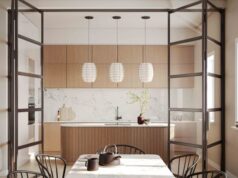
The materials you choose for your kitchen benchtop will affect the price both in terms of the cost of the bench itself, and in terms of the labour required to install it. Find out what you can expect to pay for different benches.

How much it’ll cost for your bench will depend on three main things:
- the value of the raw materials used for your benchtop
- the size and design specifications, and
- any special custom machining or installation requirements.
The biggest defining factor is the cost of the materials – there’s a vast difference in price between laminate benchtops at the lower end of the price scale (which you may even get for several hundred dollars), and marble at the top end (which can run into the tens of thousands of dollars).
Determining costs
Determining how much a bench will cost is normally just a matter of identifying a material, and then submitting your design (complete with accurate measurements) for a costing by a builder or manufacturer. For some materials, the manufacturer will require a template to make a benchtop; the more cut outs, edging, corners, joins and custom colours or patterns you want, the more the final product will cost.
If you’re really keen to keep prices down, your best bet is to design with standard-pre-cut sizes in mind, and stick with available colours and configurations.
Example
As a quick guide let’s look at engineered stone.
Engineered stone only comes in 3000mm x 1400mm slabs. For a particular brand, it comes in a standard or deluxe colour and will be anything from 20mm to 200mm in thickness. It requires an edge profile, and the waterfall ends should be mitre jointed. If you’re hoping to install an undermounted sink, further installation and polishing work is also required.
The average kitchen will take a bench with a depth of 600mm; however a kitchen with an island that is 900mm wide requires two slabs of stone. The cost of installation for this type of bench may be around $3000. The cost of the same bench with waterfall ends, undermounted sinks, non-standard depths and custom colours, by contrast, would be far more.





